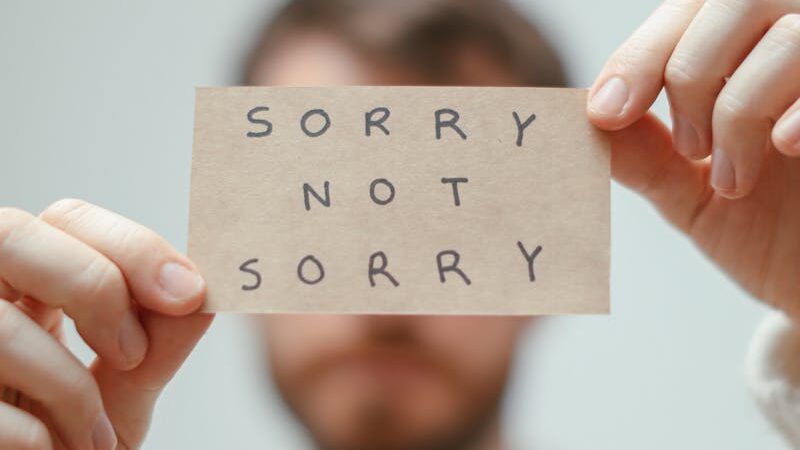Ever whispered something in a tender moment, only to watch your partner’s face cloud over? It’s startling how a few misplaced words can rattle the windows of our love paradise.
I’m Claire Delli Santi, and trust me, I’ve seen “what you should never say to your partner” play out in countless ways over my years as a relationship coach.
So, let’s lean in together and explore these verbal landmines—join me in uncovering the phrases that could spell the end of bliss.
And, If you’re curious about the nature of your relationship, check out our article about the different types of relationships and how to deal with them.
1. ‘This is Just Like You’ and the Danger of Predictions”
Ever heard “This is just like you”? It’s like a jab to the heart, isn’t it? As I’ve learned in my recent years of research, such predictions are primed to brew resentment. When you slap a label on someone, you’re not just making an assumption; you’re denying them the chance to change.
I’ve seen it firsthand—how a single phrase can put walls where there were open fields. So let’s toss out that crystal ball and embrace the beautiful, messy, unpredictable journey of growth together.
Tip: Swap predictions for encouragement and watch your partner blossom.
2. ‘Nothing’ Is Not an Innocent Bystander”
Silence can speak volumes, and sometimes, it’s as cutting as a dagger. The silent treatment, or a simple “nothing,” when something is clearly wrong, can be as damaging as any harsh word.
It’s a form of emotional withdrawal that can create a chasm of disconnect. While some argue it’s a way to cool down, in my view, it often just delays resolution and deepens wounds.
Tip: Open communication is the lifeline of love. Even when it’s hard, sharing is caring.
3. You’re Overreacting’ Is Not Your Call”
Telling your partner “You’re overreacting” is a prime example of what you should never say to your partner. This phrase dismisses their feelings and invalidates their experience, which can be damaging to their mental health and your relationship’s emotional climate.
Research shows that such invalidation can lead to emotional distress and strain the relationship over time. And, I’ve learned that recognizing and validating feelings is essential for trust and a healthy relationship.
Tip: Listen and empathize rather than judge their emotional response. It can transform your communication.
4. ‘You Always’ or ‘You Never’ and the Myth of Consistency”
“You always” or “You never” paint everyone with the same broad strokes, ignoring the complex, ever-changing nature of human behavior. Psychological research confirms that such absolutes can not only be unfair but can also trigger defensive responses, damaging communication.
While some believe these phrases motivate change, they more commonly incinerate the bridges of understanding. In the world of love, it’s the fine details that matter.
Tip: Swap absolutes for accurate observations to foster healthier dialogues.
You may also like:
11 Biggest Red Flags to Watch Out for In A Relationship
12 Tips to Deal With a Tumultuous Relationship (What to Avoid, Warning Signs, Stay or Leave?)
5. ‘I’m Sorry You Feel That Way’ Is Not an Apology”
When you hear “I’m sorry you feel that way,” it’s like someone’s serving empathy with a side of sarcasm. It’s a classic non-apology that can chip away at trust, leaving you feeling like your emotions are on trial.
Some might argue it shows understanding, but let’s be real—it’s often a polite brush-off. As someone who’s navigated these waters, I’ll tell you, a genuine apology acknowledges the misstep, not just the reaction.
Tip: A heartfelt “I’m sorry I hurt you” goes miles further than a hollow “I’m sorry you’re hurt.”


6. ‘If You Loved Me, You Would…’ Is Emotional Blackmail”
Ever been hit with an “If you loved me, you would…”? That’s emotional blackmail hiding in the guise of love. It’s a manipulative tactic that’s about as healthy as a diet of fast food.
It creates a love that’s conditional, where you’re only as good as your last performance. I’ve seen it, and I’ve lived it. True love doesn’t keep score.
Tip: Encourage acts of love, don’t demand them. It keeps the relationship real and the love genuine.
7. ‘Shut Up’ Is a Verbal Hand Grenade”
Throwing out a “Shut up” is like lobbing a grenade into the heart of a conversation. It’s immediate, it’s explosive, and the shrapnel can hit deeper than you think.
Some might say it’s a way to assert dominance, but let’s cut through that noise—it’s downright disrespectful. In my journey, I’ve learned that respect is the soil in which love grows.
Tip: Choose to listen instead of silencing; it’s the kind of respect that speaks volumes.
8. ‘Calm Down’ Can Heat Things Up”
Telling someone to “calm down” is like trying to extinguish fire with gasoline—it just doesn’t work. It’s a phrase that’s meant to soothe but often ends up fanning the flames of frustration.
In heated moments, this can feel dismissive and patronizing, escalating the tension rather than diffusing it. Through my experiences, I’ve learned that the art of de-escalation lies in empathy and patience.
Tip: Try “I understand this is important to you. Let’s work through this together,” and watch the magic happen.
9. ‘I Wish I Never Met You’ and the Power of Regret”
“I wish I never met you” is a phrase that can shatter hearts and leave scars that last long after the words are spoken. It’s a verbal manifestation of regret that can unravel the very fabric of a relationship.
Such words are often recalled in debates as they carry a weight that can tip the scales from repair to ruin. Words have power; they linger and shape our narratives.
Tip: Focus on healing conversations that build bridges, not words that plant mines.
10. ‘My Ex Would Have…’ Is a No-Go Zone”
Dropping the “My ex would have…” bomb is like setting fire to the trust and security in your current relationship. Comparing your partner to an ex is a surefire way to dig a moat of insecurity around your love castle.
Some might argue that a little competition could spur improvement, but I’ve seen it do more demolition than construction. Every relationship is a unique journey, and comparisons just detour you into dangerous territory.
Tip: Celebrate what your partner brings to the table; it’s their exclusive flavor that makes your relationship recipe work.
The 3 Love Assassins (The Most Fatal Phrases)
Navigating the minefield of love, some phrases are like pulling the pin on a grenade. Here are the three most fatal ones:
“This Is Your Fault”
Blame is the acid that corrodes the trust and partnership in a relationship. It’s a destructive force that psychologists have found undermines the mutual support that’s essential for a relationship’s resilience.
“I Don’t Need You”
While self-sufficiency is vital, this phrase dismisses the power of mutual support. It ignores the fact that in the most robust relationships, partners lean on each other, balancing autonomy with interdependence.
“You’ve Changed”
Change is inevitable, but this accusation often stings with negativity. It fails to recognize that personal growth can be a positive force in a relationship, not a threat.
Why are these phrases so toxic?
- They create an adversarial atmosphere, rather than a collaborative one.
- They undermine the support system that is crucial for a healthy relationship.
- They fail to acknowledge that change is a part of the human experience.
In my view, balance is key:
- Embrace accountability without finger-pointing, fostering a supportive environment for open communication.
- Cherish independence while valuing the bond you share, recognizing the strength that comes from a partnership.
- Celebrate growth and change as a part of life’s journey together, acknowledging that each person’s evolution can enrich the relationship.
Conclusion
Words craft the foundations and frame the very essence of our love stories. They have the might to mend or mangle the bridges we’ve built with our partners.
As we’ve explored, some phrases are termites in the timber of trust. I urge you, reflect on your verbal blueprints.
Are they designs for devotion or blueprints for breakdown? Choose your words to construct, not to condemn, and watch your love paradise stand strong.
FAQs
What should couples not talk about?
Couples should steer clear of comparisons to exes or making accusatory statements that can lead to a strained relationship. Prioritize constructive conversation for a lasting relationship.
What can ruin a perfect relationship?
Harsh statements, emotional blackmail, and a lack of effective communication can damage relationships. Fostering a supportive environment through honest conversation is key to a successful relationship.
What shouldn’t I tell my partner?
Avoid phrases that undermine trust, like “You always” or “You never,” which are toxic phrases that can cause emotional distress. Stick to honest communication to maintain a healthy relationship.
What a wife should never say to her husband?
A wife should avoid hurtful phrases that trigger feelings of worthlessness or trust issues. Emphasize mutual respect and quality time to strengthen your committed relationship. Learn more about the phrases you should never say to your husband.




